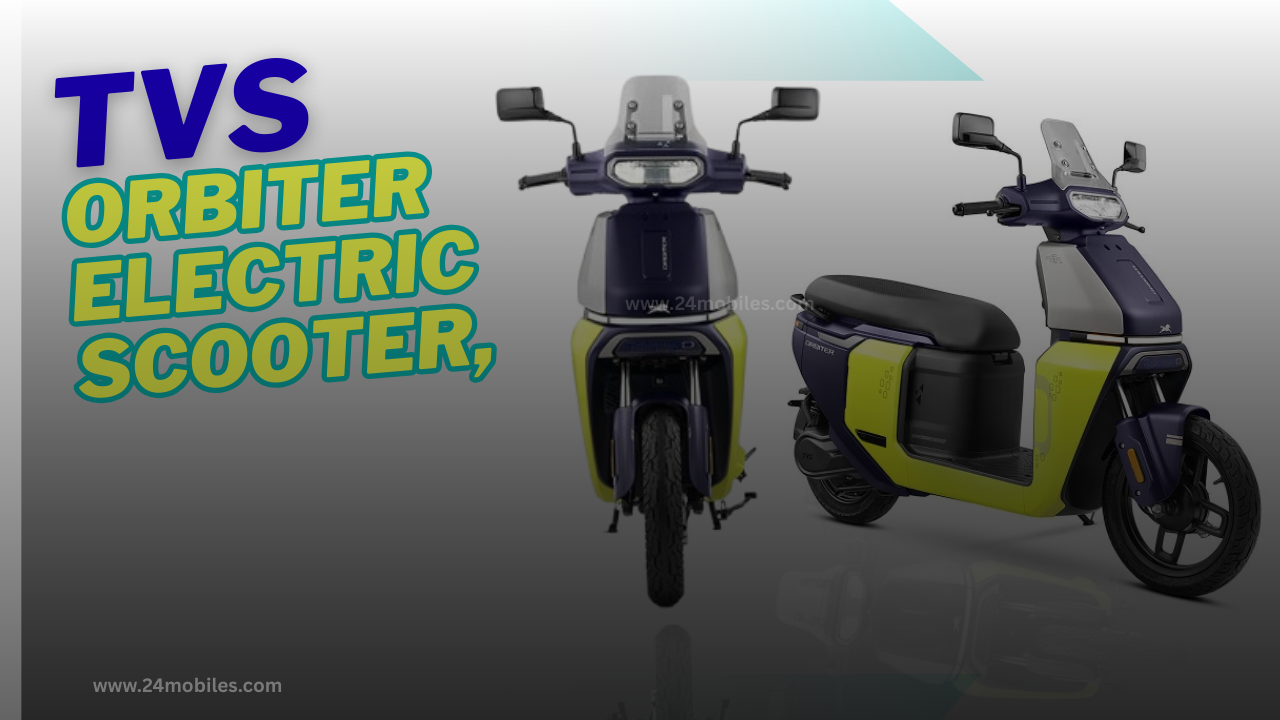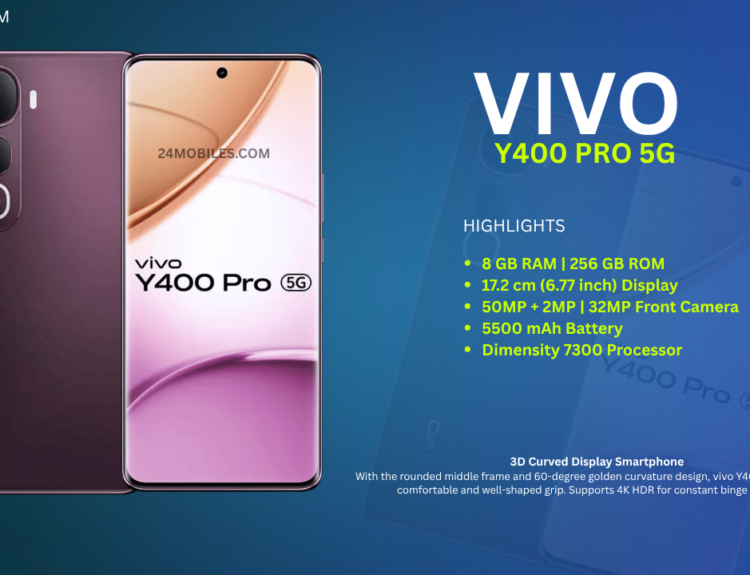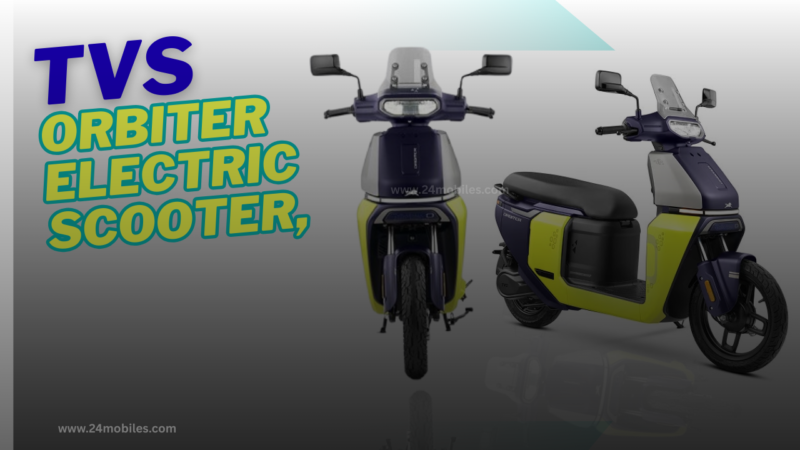TVS Orbiter Electric Scooter vs TVS iQube: Which One Makes More Sense in 2025?
Hello friends, and welcome to 24mobiles.com. The electric two-wheeler market in India is buzzing with new launches, and TVS has once again managed to grab everyone’s attention. The company, which already has the popular iQube in its EV lineup, has now introduced a brand new scooter, the TVS Orbiter. Positioned as an entry-level model, the Orbiter aims to attract riders who want an affordable, practical, and feature-packed electric scooter without compromising on range or everyday usability. But how different is the TVS Orbiter Electric Scooter from the well-established iQube? And more importantly, which one should you buy? Let’s take a closer look.
Design of the TVS Orbiter
The design of the TVS Orbiter is refreshingly practical and focused on real-world usage. It comes with a flat and extended seat that measures 845mm, ensuring a comfortable riding position for both rider and pillion. Unlike many modern scooters that compromise on utility, the Orbiter features a flat floorboard, which makes it easier to carry bags and adds to its convenience. One of its strong points is the under-seat storage, which has been increased to 34 litres. This is slightly larger than the iQube’s 32-litre storage and allows space for a helmet along with smaller essentials. At the front, the Orbiter sports a high-mounted LED headlamp cluster with an integrated DRL strip, giving it a modern appeal. The rear design is equally stylish with a single LED light bar that enhances its futuristic look. The scooter rides on 14-inch wheels on both ends and has a ground clearance of 169mm, making it more adaptable to Indian road conditions.
Premium-Looking
In contrast, the TVS iQube has always been positioned as a more premium-looking scooter. Its design is sleeker, with smooth body lines and a more upmarket finish. However, it does come with slightly smaller 12-inch wheels, and its under-seat storage is limited to 32 litres, which is marginally less than the Orbiter. Where the iQube scores big is in technology. It is equipped with a 7-inch touchscreen TFT display that brings a host of smart features such as turn-by-turn navigation, call and SMS alerts, ride statistics, document storage, and even crash/fall alerts. This makes it highly appealing to riders who want their scooters to feel like an extension of their smartphones.
The TVS Orbiter may not have a touchscreen, but it is not short on tech. In fact, it is the first scooter in its segment to introduce cruise control, which allows the rider to maintain a constant speed without constantly holding the throttle – a feature usually seen in cars. It also comes with automated hill assist, ensuring the scooter does not roll back on inclines, making it extremely useful for city rides with slopes and flyovers. A USB charging port has been integrated for mobile devices, and its digital instrument cluster offers Bluetooth connectivity with features like live tracking, towing alerts, anti-theft notifications, vehicle health updates, and even nearby charging station locations. These features clearly show that TVS has designed the Orbiter to balance practicality with cutting-edge technology.
TVS Orbiter vs TVS iQube — Highlight Features
Copy‑ready, AdSense‑friendly table. Header in navy blue, colourful zebra rows, and mobile responsive via horizontal scroll. Paste this block into your article on 24mobiles.com.
| Feature | TVS Orbiter | TVS iQube | Notes |
|---|---|---|---|
| Positioning | Entry-level, practical daily EV | Premium, tech-forward EV | Two different buyer profiles |
| Battery & Range | 3.1 kWh; up to 158 km (claimed) | 2.2 / 3.1 / 3.5 / 5.3 kWh; ~100–180+ km (variant-dependent) | Larger iQube packs suit longer rides |
| Segment-first Feature | Cruise control New | — | Makes steady-speed cruising easier |
| Rider Aids | Automated hill assist | Ride modes; crash/fall alerts (on select variants) | Both focus on safety in different ways |
| Instrument Cluster | Digital cluster with Bluetooth | 7-inch TFT touchscreen with navigation & alerts | iQube offers a larger, richer UI |
| Connectivity | Live tracking, anti‑theft, vehicle health, nearby chargers | Navigation, call/SMS, document storage, stats, alerts | App experiences differ; both are feature-rich |
| Storage (Under‑seat) | 34 L | 32 L | Orbiter fits a bit more |
| Wheels | 14‑inch (front & rear) | 12‑inch (front & rear) | Bigger wheels aid stability on rough roads |
| Ground Clearance | 169 mm | Notably lower on most variants | Orbiter is friendlier to speed breakers |
| Seat & Floorboard | Flat, extended seat (845 mm); flat floor | Premium finish; conventional floor | Orbiter emphasises practicality |
| Lighting | High‑mounted LED headlamp; DRL strip; single LED tail bar | Modern LED setup (variant dependent) | Both offer contemporary lighting |
| Charging & Ports | USB charging port onboard | USB on select variants | Handy for phones & accessories |
| Colours | Stratos Blue, Neon Sunburst, Stellar Silver, Lunar Grey, Martian Copper, Cosmic Titanium | Multiple mono & dual‑tone options (variant‑wise) | Orbiter skewed youthful; iQube skewed classy |
| Price (ex‑showroom) | ~₹99,000 (introductory) | ~₹1.09 lakh (3.5 kWh); higher for larger packs | Pricing varies by state incentives |
| Who Should Buy? | Budget‑minded city riders, students, delivery use | Tech‑savvy riders seeking premium features & range options | Pick based on usage & budget |
Performance and Range
Performance and range are the two most important aspects of any EV, and here too the Orbiter makes an interesting case. The scooter comes with a single 3.1 kWh battery pack, which, according to TVS, delivers a claimed range of up to 158 km on a single charge. For most city users, this is more than enough for a couple of days’ commute before needing a recharge. The iQube, however, offers more flexibility by providing multiple battery pack options. Buyers can choose from 2.2 kWh, 3.1 kWh, 3.5 kWh, and even a large 5.3 kWh variant. Depending on the chosen battery, the iQube’s range can vary between 100 km to 180+ km. This makes the iQube more customizable depending on the buyer’s budget and usage requirements.
When it comes to pricing, the TVS Orbiter takes the crown as the more affordable option. With an introductory ex-showroom price of around ₹99,000, it directly appeals to budget-conscious buyers who want to switch to an EV without stretching their finances. The iQube, in comparison, is priced at around ₹1.09 lakh for the 3.5 kWh variant, with higher battery versions costing even more. While the iQube does justify its higher price with advanced features and greater range options, the Orbiter makes a strong case for itself by combining affordability with essential modern features.
Colour choices
Colour choices also reflect the personality of both scooters. The TVS Orbiter is available in six youthful and energetic shades: Stratos Blue, Neon Sunburst, Stellar Silver, Lunar Grey, Martian Copper, and Cosmic Titanium. These bright and vibrant colours are clearly targeted towards younger buyers who want their scooter to stand out. The iQube, on the other hand, offers monotone and dual-tone finishes that give it a more professional and premium look, appealing to slightly older and more sophisticated buyers.
Of course, no scooter launch can be seen in isolation, as competition in the electric two-wheeler space is heating up rapidly. The TVS Orbiter will be taking on rivals like the Honda Activa-E, Bajaj Chetak, Suzuki e-Access, Ola S1 Air, and Ather Rizta. The iQube, meanwhile, continues to compete with slightly more premium rivals such as the Ola S1 Pro, Ather 450X, and Hero Vida V2. With both products, TVS has smartly covered different ends of the EV spectrum – the Orbiter for budget and practicality, and the iQube for tech and premium appeal.
Budget-Friendly Electric Scooter
Why Choose the TVS Orbiter Electric Scooter?
So, which one should you buy? The answer depends on your needs. Suppose you are looking for a budget-friendly electric scooter that offers practical storage, a comfortable design, a strong range, and segment-first features like cruise control. In that case, the TVS Orbiter is the ideal choice. It is clearly designed for daily city commuters who want maximum value at an affordable price. However, if you prefer a premium electric scooter with advanced technology, navigation, multiple battery choices, and a large touchscreen display, then the iQube remains the better option.
In conclusion, the TVS Orbiter is an impressive new addition that makes electric scooters more accessible to a wider audience. It strikes a balance between style, practicality, and modern features in a way that few EVs in this price range can match. The iQube, on the other hand, continues to serve buyers who are willing to spend more for a premium experience. Together, these two scooters show that TVS is committed to offering diverse solutions in the EV space, ensuring that there is something for everyone – whether you are a budget-conscious student, a working professional, or simply an enthusiast looking to switch to electric mobility.
Disclaimer: The information provided here is for general purposes only. Features, prices, and availability may change over time. Always verify details on the official TVS website or trusted retailers before making a purchase







